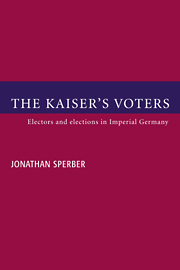Introduction
Published online by Cambridge University Press: 22 October 2009
Summary
Posing the problem
When one thinks of democracy, Germany is generally not the first country that comes to mind. Yet as early as 1848 national elections with a broad, if indirect and not quite universal franchise, were held there. Universal and direct manhood suffrage was introduced with national unification in 1867–71, that is to say at the same time as in the United States. German women received the vote in 1919, another early date by international standards. A democratic franchise for national elections has thus characterized German politics for over a century and Germans have made vigorous use of this right to vote from the very beginning. About half the eligible voters cast their ballots in the first nationwide direct elections in 1871 and turnout reached the impressive figure of 85% of eligible voters in the general elections of 1907 and 1912, the last before the First World War. In some ways this is not surprising because, as a number of historical studies have reminded us, widespread and active political organization, vigorous electioneering, and a strong popular wish to participate in the process were typical of national elections in Germany for decades before 1914.
This explanation, however, points to the problem and the reason that Germany and democracy might seem like an odd combination. While the deputies to the national parliament of Imperial Germany, the Reichstag, were elected by a democratic franchise, the elaborate and peculiar constitutional system of the empire reduced to a bare minimum the powers and prerogatives of the democratically elected people's representatives.
- Type
- Chapter
- Information
- The Kaiser's VotersElectors and Elections in Imperial Germany, pp. 1 - 32Publisher: Cambridge University PressPrint publication year: 1997
- 1
- Cited by



